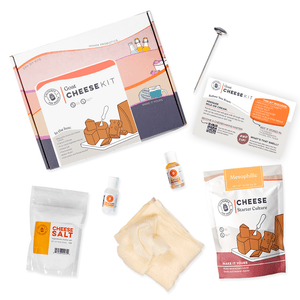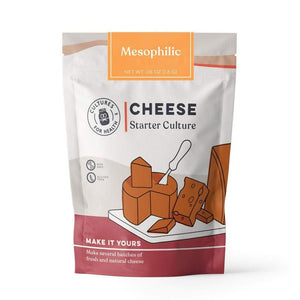
Goat cheese is usually thought of as a mild, soft cheese, but you can make a tasty cheddar with goat cheese as well!
60 minutes
4
INGREDIENTS AND EQUIPMENT AVAILABLE AT CULTURES FOR HEALTH
Goat Cheese Making Kit

Goat Cheese Making Kit
$33.99
Make a range of impressively delicious goat cheeses with this kit. Just add goat milk to make goat, chevre, and feta cheeses.
Packaging and Equipment in the kit may appear different than pictured.
Mesophilic Direct-Set Starter Culture

Mesophilic Direct-Set Starter Culture
$19.99
From cheddar, Colby, and Monterey Jack to Feta, Chevre, and more, you'll enjoy the flavor and variety of homemade cheeses made using this starter culture.
Liquid Vegetable Rennet

Liquid Vegetable Rennet
$7.99
Double-strength liquid vegetable rennet. Each bottle contains enough rennet to set (24) 2-gallon batches of cheese.
Cheese Salt

We have put together a comprehensive guide on how to make goat milk cheddar cheese. This guide includes a recipe, tips and tricks, and all the information you need to start. Download our Cheesemaking Guide and Recipe Book today to get started.
INGREDIENTS IN MAKING GOAT CHEDDAR CHEESE:
- 2 gallons whole goat milk
- 1 packet direct set mesophilic starter culture
- 1/2 tsp. liquid rennet diluted in 1/2 cup cool, unchlorinated water
- 2 Tbsp. cheese salt
INSTRUCTIONS IN MAKING GOATS MILK CHEESE RECIPE:
- Heat the milk over low heat to 85°F, stirring continuously.
- Turn off the heat and add the starter by sprinkling it over the surface of the milk and allowing it to rehydrate before stirring it in with your cheese spoon. Stir using up-and-down motions for one minute. Cover the milk and allow to ripen undisturbed for 30 minutes.
- Add the diluted rennet by pouring it through the holes of your cheese spoon and into the milk. Stir in well, using the cheese spoon in up-and-down motions. Cover the milk and allow it to set for 1 hour, maintaining the temperature at 85°F throughout. (You can use a water-bath method to achieve this.)
- Cut the curd into 1/2-inch cubes. Let the curds rest, undisturbed, for 1 minute.
- Begin gradually heating the curds, bringing the temperature up slowly to 98°F, increasing the temperature by only 2 degrees every 5 minutes. Stir frequently and gently to keep the curds from matting. Once you have achieved 98°F, maintain the curds at that temperature for 45 minutes, continuing to stir gently.
- Drain off the whey and stir in the salt. Mix the salt in well, using the cheese spoon or by tossing the curds with your hands.
- Line a 2-pound cheese press with dampened cheesecloth. Quickly begin scooping the warm curds into the press. Press the cheese at 20 pounds of pressure for 15 minutes.
- Remove the cheese from the press, unwrap it, flip it over, and re-dress it in the cheesecloth. Place it back into the press at 30 pounds of pressure for 1 hour.
- Remove, undress, flip, and re-dress the cheese. Press at 50 pounds of pressure for 12 hours.
- Remove the cheese from the press. Peel away the cheesecloth, and rub salt over all the surfaces of the cheese.
- Place on a cheese board. Rub salt on it once daily for 3 days, flipping frequently. When the surface of the cheese is dry, you can wax it.
-
Age the cheese at 50° to 55°F for 4 to 12 weeks.
If you're looking for an easy-to-follow guide on how to make goat milk cheddar cheese, then download our Cheesemaking recipe book today.
















